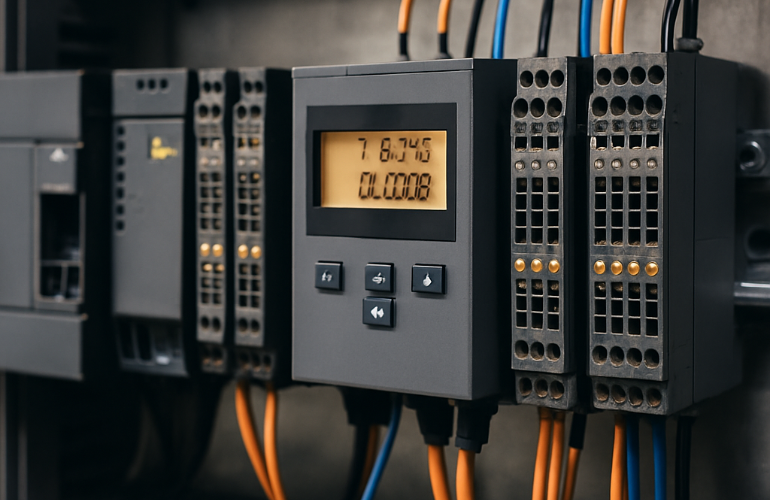In today’s fast-paced manufacturing world, production systems are becoming more complex and demanding. To meet these demands, industries rely heavily on industrial controllers. These components play a crucial role in automating and managing production processes efficiently and safely. This blog will explain the role of industrial controllers in modern production systems, why they are important, their benefits, and how they contribute to better industrial operations.
What Are Industrial Controllers?
Industrial controllers are specialized electronic devices designed to manage machines and processes in industries. They receive inputs from sensors, process the information, and send commands to machines or equipment to perform specific tasks. This control can be simple, like switching a motor on or off, or complex, like managing a whole assembly line.

There are various types of industrial controllers, including Programmable Logic Controllers (PLCs), Distributed Control Systems (DCS), and microcontrollers. Each type has its use depending on the complexity and requirements of the production system.
Importance of Industrial Controllers in Modern Production
Modern production systems are highly automated and require precise control to maintain quality, safety, and efficiency. Industrial controllers are essential because:
- Automation: They automate repetitive and complex tasks, reducing the need for manual intervention.
- Precision: They ensure machines work accurately to maintain product quality.
- Safety: Controllers monitor equipment conditions and prevent accidents by shutting down faulty machines.
- Efficiency: They optimize production speed and reduce energy consumption.
- Data Collection: Industrial controllers collect valuable data that helps in monitoring and improving production processes.
How Industrial Controllers Work in Production Systems
In a typical production system, industrial controllers act as the brain of the operation. Here is a simplified flow of how they work:
- Input Collection: Sensors installed on machines send real-time data to the controller, such as temperature, pressure, speed, or position.
- Processing: The controller analyzes this data based on pre-programmed instructions or logic.
- Decision Making: It decides what action to take, such as starting or stopping a machine, adjusting speed, or changing a process parameter.
- Output Execution: Commands are sent to actuators or machines to carry out the action.
- Monitoring: The controller continuously monitors the system for any changes or faults.
This real-time control helps maintain smooth and uninterrupted production.
Types of Industrial Controllers Used in Production Systems

There are several types of industrial controllers commonly used in production:
1. Programmable Logic Controllers (PLCs)
- PLCs are digital computers used to control machines. They are flexible and can be programmed to perform a variety of tasks. PLCs are widely used due to their reliability and ease of use.
2. Distributed Control Systems (DCS)
- DCS is used for complex processes that require multiple control loops. It distributes control tasks among various controllers connected over a network, providing greater flexibility and control.
3. Microcontrollers
- These are smaller controllers used for specific tasks in embedded systems within machines.
Each type plays a significant role in different production environments.
Benefits of Using Industrial Controllers
Using industrial controllers in production systems brings many advantages:
- Increased Productivity: Automation speeds up production and reduces downtime.
- Consistency and Quality: Controllers ensure every product is made to exact specifications.
- Reduced Human Error: Automation minimizes mistakes caused by manual operations.
- Cost Savings: Less manual labor and improved efficiency reduce operational costs.
- Enhanced Safety: Controllers monitor hazardous conditions and prevent accidents.
- Flexibility: They can be reprogrammed or upgraded to meet changing production needs.
Industrial Controllers and Industry 4.0
With the rise of Industry 4.0, which focuses on smart manufacturing and connectivity, industrial controllers have evolved further. Modern controllers can communicate with other devices, send data to cloud platforms, and integrate with advanced analytics tools. This connectivity allows companies to monitor production remotely, predict maintenance needs, and optimize operations using artificial intelligence and machine learning.
How to Choose the Right Industrial Controller for Your Production System

Choosing the right controller depends on:
- The complexity of your production process.
- Required control precision.
- Environmental conditions (e.g., temperature, dust).
- Communication needs and integration with other systems.
- Budget constraints.
Future Trends in Industrial Controllers
The future of industrial controllers looks promising with advancements such as:
- Greater integration with IoT devices.
- Enhanced AI capabilities for smarter decision-making.
- Improved energy efficiency and sustainability features.
- More user-friendly interfaces and programming tools.
- These trends will continue to improve productivity and innovation in production systems.
Industrial controllers are the backbone of modern production systems. They automate processes, improve efficiency, enhance safety, and help maintain product quality. With continuous technological advancements, these controllers are becoming smarter and more connected, driving the future of manufacturing.

